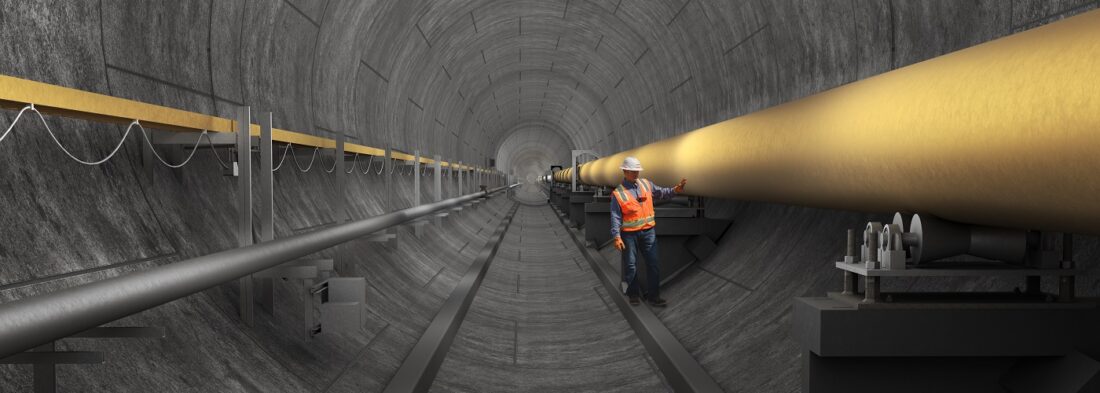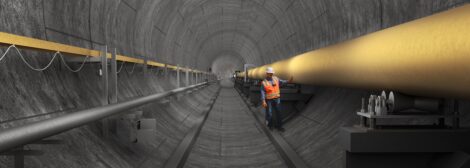Cavitt supports Line 5 tunnel project

Courtesy Photo This is a rendering of what the proposed tunnel for Line 5 would look like if completed. The Army Corps of Engineers is determining whether or not to approve needed permits so construction of the tunnel can begin.
ALPENA — The public comment period for people to speak over the proposed tunnel that would house Line 5 has concluded and now the decision whether or not to grant the needed permits falls to the Army Corps. of Engineers. The Army Corps. could rule on the needed permits before winter.
State Rep. for Northeast Michigan Cam Cavitt, R-Cheboygan and several of his Republican cohorts submitted a letter of support for the project and explained why the tunnel is the best option moving forward for Line 5.
Line 5, which transports oil and natural gas liquids over 645 miles from Wisconsin to Ontario, has a four-mile stretch that lays just off the bottom of the Straits of Mackinac.
The project would have a tunnel bored about 100 feet below the lakebed and Line 5 would be secured in it. Enbridge owns, operates, maintains, and monitors the pipeline.
A joint letter from Cavitt, as well as State Reps. Parker Fairbairn, Karl Bohnak, Greg Markkanen, and Dave Prestin says they believe the construction of the tunnel will bring many high-paying jobs to northern Michigan, help to meet critical energy needs to people who live in Michigan’s Upper Peninsula, and protect the Great Lakes from a potential spill, should the more than 50-year-old pipe fail.
“From rural U.P. communities to the diverse industry of Southeast Michigan, the Line 5 pipeline is critical to providing jobs and energy for people and businesses throughout Michigan and the broader Midwest,” the joint letter states. “Enbridge is going above and beyond to mitigate all potential risks with their operation by proposing a significant investment in our state that would simultaneously protect our environment and secure this key pipeline for many decades to come.”
The letter states that the completion of the Great Lakes Tunnel Project means the Line 5 pipeline would be buried deep beneath the Straits of Mackinac, removing any chance of an oil spill caused by an anchor strike.
“This pipeline has been safely operational for nearly 80 years,” the joint letter says. “However, even the soundest operations can be improved. That’s why Enbridge is proactively trying to make this investment to upgrade the infrastructure and protect the Great Lakes. We agree – and that’s why it is so frustrating to see activists, inside and outside of the state government, oppose the project with emotional and political rhetoric, rather than practical and scientific arguments that support its construction.”
Opponents of Line 5 have stated a variety of reasons they do not support the project.
According to a press release from Progress Michigan, “independent safety experts have testified on the record regarding its explosion risks.”
A July Progress Michigan poll “found that a majority of Michigan voters … oppose state agencies granting Enbridge permits to construct the Line 5 oil tunnel project.”
“From safety risks to threats of an oil spill disaster in the Great Lakes, allowing the Line 5 oil tunnel project to get built would put one-fifth of the world’s available, fresh surface water in harm’s way,” Sam Inglot, executive director of Progress Michigan, said in a press release. “This is a foreign corporation’s fossil fuel project that Michigan taxpayers would be on the hook for owning for 99 years. In other words, our grandkids are going to have to end up dealing with this short-sighted decision.”
Cavitt said the state government has fulfilled its duties and now the federal government will have the last say on whether or not the tunnel is constructed. He said having Line 5 deep beneath the Earth, in a concrete tunnel which will feature concrete walls about a foot-and-a-half thick protects against an environmental catastrophe, while ensuring the economies in the UP are not harmed, but improved. Cavitt said tunneling technology is safe and reliable and shared an example of another tunnel in Michigan that has been operating for nearly a century.
“The Detroit-Windsor Tunnel in Detroit was built in 1930, so we know how to do this and do this safely,” Cavitt said. “The tunnel will help to improve the quality of the water in the Great Lakes, and Line 5 will no longer be threatened by anchor strikes. The line would be protected in the tunnel.”
Enbridge Communications Strategist Ryan Duffy said if the Army Corps of Engineers grants the needed permit, another permit needs to be renewed by the Michigan Department of Environment, Great Lakes,and Energy. Then, Duffy said, the already selected contractor to do the work will begin the work on the tunnel. He said the tunnel will take between four to five years to complete. He said the energy company wants to finish the project as soon as possible, but it won’t sacrifice safety to people or the environment to push timelines up.
“It is a 600 foot boring machine that only drills about 40 feet a day, so this is a huge project that is going to take time to complete,” he said. “Our focus will be on safety and doing things the right way, but still doing it as efficiently as possible.”
Duffy said when complete, the tunnel and pipeline will include many safety systems to protect against any unexpected malfunctions or accidents and react to them at a moment’s notice.
“There will be a gas detection system, 24-hour monitoring, a system that detracts and alerts us of a loss of pressure, and an auto shutoff system,” he said. “We have also designed specialized vehicles to use inside the tunnel.”
When the tunnel is built, Enbridge will transfer ownership of it to the Mackinac Straits Corridor Authority, but will continue to oversee its operations and maintenance. Duffy said the tunnel can also be used to run other utilities through it, including fiber for high-speed internet and electricity. He said fiber companies have already reached out to the Mackinac Straits Corridor Authority with interest in leasing space in the tunnel to help improve fiber infrastructure in the UP.
Steve Schulwitz can be reached at 989-358-5689 or sschulwitz@TheAlpenaNews.com. Follow him on X @ss_alpenanews.com.





